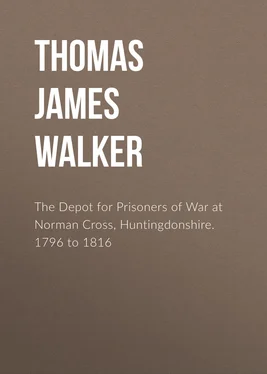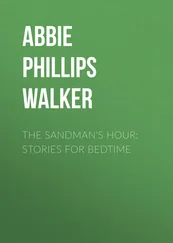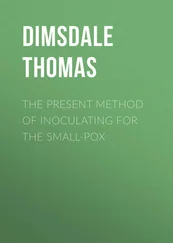Thomas Walker - The Depot for Prisoners of War at Norman Cross, Huntingdonshire. 1796 to 1816
Здесь есть возможность читать онлайн «Thomas Walker - The Depot for Prisoners of War at Norman Cross, Huntingdonshire. 1796 to 1816» — ознакомительный отрывок электронной книги совершенно бесплатно, а после прочтения отрывка купить полную версию. В некоторых случаях можно слушать аудио, скачать через торрент в формате fb2 и присутствует краткое содержание. Жанр: foreign_prose, История, foreign_edu, foreign_antique, на английском языке. Описание произведения, (предисловие) а так же отзывы посетителей доступны на портале библиотеки ЛибКат.
- Название:The Depot for Prisoners of War at Norman Cross, Huntingdonshire. 1796 to 1816
- Автор:
- Жанр:
- Год:неизвестен
- ISBN:нет данных
- Рейтинг книги:3 / 5. Голосов: 1
-
Избранное:Добавить в избранное
- Отзывы:
-
Ваша оценка:
- 60
- 1
- 2
- 3
- 4
- 5
The Depot for Prisoners of War at Norman Cross, Huntingdonshire. 1796 to 1816: краткое содержание, описание и аннотация
Предлагаем к чтению аннотацию, описание, краткое содержание или предисловие (зависит от того, что написал сам автор книги «The Depot for Prisoners of War at Norman Cross, Huntingdonshire. 1796 to 1816»). Если вы не нашли необходимую информацию о книге — напишите в комментариях, мы постараемся отыскать её.
The Depot for Prisoners of War at Norman Cross, Huntingdonshire. 1796 to 1816 — читать онлайн ознакомительный отрывок
Ниже представлен текст книги, разбитый по страницам. Система сохранения места последней прочитанной страницы, позволяет с удобством читать онлайн бесплатно книгу «The Depot for Prisoners of War at Norman Cross, Huntingdonshire. 1796 to 1816», без необходимости каждый раз заново искать на чём Вы остановились. Поставьте закладку, и сможете в любой момент перейти на страницу, на которой закончили чтение.
Интервал:
Закладка:
12
Appendix A.
13
Auctioneer’s Catalogue , (Jacobs’ Peterborough, 1816).
14
M. Foulley’s description of his model on Key Plan, Pl. xx., p. 251.
15
The following entry in the Register of Marriages in St. John’s Church, Peterborough, probably explains the reason for the housing of the surgeon in a comfortable brick house within those prison walls, instead of in the very indifferent quarters in the hospital casern:—
“October 18th, 1808, George H. Walker of Yaxley to Elizabeth Colinette Pressland of St. John’s.—Witnesses: Thomas Pressland, Thomas Alderson Cook, James Gibbs.”
Mr. George H. Walker was the surgeon to the Prison, which was in the Parish of Yaxley, and Captain Pressland, R.N., had been for some years, after the renewal of the war in 1803, Superintendent of the Prison, so among all these dry details crops up the picture of our human life. We see the young medical officer passing through the door in the Prison wall which communicated with the Superintendent’s house (the door over which the wall is seen rising with a ramp in the photographs of the only fragments of the wall now remaining) to spend happy hours with Captain Pressland’s family. We see friendship ripening into love, the story told by the entry in the Register of St. John’s Church, Peterborough, and then in the Register of St. Peter’s, Yaxley, we are brought face to face with a tragedy, for the last entry of a burial from the Depot is “Captain Thomas Pressland, Norman Cross. March 21st, 1814. 59 years. Signed, J. Hinde, Curate,” and there can be little doubt that from the house to which, mainly through his future father-in-law’s influence, Surgeon Walker was able in the third year of its existence to bring Elizabeth Colinette Pressland as his bride, while the bells of Yaxley Church rang out a merry marriage peal, six years later passed the body of Captain Pressland himself to be laid in Yaxley Churchyard, while the death bell tolled its solemn note. For six years this house was the house of the couple for whom it was built. It was in the auctioneer’s catalogue, when it was sold on the 2nd October 1810, nothing more than “An excellent brick dwelling-house, containing a cellar 12 ft. 6 in. by 11 ft. 2 in., parlour 13 ft. 3 in. by 13 ft. 8 in., etc., etc.” To us, 100 years later, it is a part of the great tragedy of Norman Cross, and by the light of the registers we see it in those short eight years from its building to its destruction the scone of the brightest joys and the deepest griefs of men and women whose names we know, whose persons we can imagine, and who help to clothe those cold, dry records with the warmth of human life.
16
On a range of the stabling purchased in 1816 to be re-erected as farm buildings in a neighbouring village, over one of the doors there stands out in bold relief, owing to the protective influence of the paint, the letters B. A. T., and in the auctioneer’s catalogue the Range is described as Bathorse Stable Range. From Stœqueler’s Military Encyclopædia , we learn that “Bat” signified a pack saddle; “Bathorse,” one which carried a pack; “Batman,” the man in charge of the Bathorse. The latter term came to be used for an officer’s servant, while the Bathorse Stable was applied to a military stable for draught and other horses.
17
In his interesting romance, The French Prisoners of Norman Cross , the Rev. Arthur Brown speaks of Mr. Vise as Chief Surgeon at the Prison; this, of course, is an error, the prisoners were not attended by the neighbouring practitioners. The statement that the surgeons were all English is also erroneous.
18
Major Kelly was highly esteemed and at the time of his death (when the Indian Mutiny was not yet quelled) the following lines were published in a local newspaper:—
Peace to the virtuous brave!
Another son of chivalry lies low:
Not in the flush of youth he finds a grave,
Not stricken to the dust by foreign foe
He fainting falls;—but laden with full years,
With white-hair’d glory crown’d, he lays him down
In earth’s maternal lap, and with him bears
Benevolence, high honour, renown,
And love-begetting mem’ries, such as throw
A halo round the thoughts of mortals here below.
Earth! keep thy treasured dead
Awhile, in holy trust! Not with vain tears
Wail we the loss of him who bravely bled
For England’s might and weal, in early years,
When life’s warm pulse beat high, and buoyant hopes
On tip-toe look’d afar at distant fame;
When views of greatness fill’d his vision’s scope,
And daring deeds lent glory to a name:
Here on our soldier’s grave no tear should fall;
All hidden be our grief, as ’neath a funeral pall.
O! that in this, our need,
This hour of trial, when the swart Sepoy
Blurs the fair front of nature, with each deed
Of villainy conceiving; when the joy
That, like the sun, lights up affection’s eyes,
Is blotted out by Indian hate and lust—
O! that a host of Kellys could arise,
And with avenging steel, unto the dust,
Smite down the Smiter, that the world might know
How true the Briton as a friend, how mighty as a foe!
O. P. The Peterborough Advertiser , 13th February 1858.This monody not only shows the esteem in which the Major was held by the local poet and his neighbours, but in the last stanza it revives the memory of a crisis in the history of the empire, and of the throes of the Indian Mutiny, from which our country was suffering when Major Kelly died.
19
Auctioneer’s Catalogue (Peterborough: G. Robertson, Bookseller. 1816!)
20
The most valuable direct evidence as to the appearance of the barracks and prison which I was able to obtain in 1891, was from an old Mr. Lewin of Yaxley, who was born in 1802, and had been very familiar with the Depot in his childhood. He used frequently to ride in through this west gate in the tradesmen’s carts, but he spoke always of the entrance on the south front as the main entrance. This old gentleman’s memory was wonderfully clear, and his accounts I regarded as thoroughly trustworthy.
21
The well-known Stilton cheese was never made at Stilton, which was not in a dairy district; it was made in Leicestershire and sent to Stilton, where Mr. Cooper Thornhill, the sporting landlord of the old sixteenth-century coaching inn, The Bell (he once for a wager rode 218 miles on horseback in 12 hours and 15 minutes), used to supply it to his customers, selling the cheeses, it is said, at half a crown a pound.
22
To the post of agent at Norman Cross there were appointed, during the seventeen years in which the prison was occupied, two civilians and four naval officers. Of the two civilians, Mr. John Delafons sent in his formal resignation eight days after his appointment.
Mr. James Perrot, appointed on the 7th April 1797, held his office until January 1799.
Captain Woodriff, R.N., appointed January 1799, held his office until the Peace of Amiens, April 1802 (see Appendix B).
Captain Thos. Pressland, R.N., was appointed after the War was renewed in May 1803, and served from 18th June 1803 until August 1811.
Captain J. Draper, R.N., succeeded to the post, and held it until his death in February 1813.
Captain W. Hansell, R.N., became agent on the death of Captain Draper, and relinquished the post in August 1814 after the Abdication of Buonaparte and his retirement to Elba.
Читать дальшеИнтервал:
Закладка:
Похожие книги на «The Depot for Prisoners of War at Norman Cross, Huntingdonshire. 1796 to 1816»
Представляем Вашему вниманию похожие книги на «The Depot for Prisoners of War at Norman Cross, Huntingdonshire. 1796 to 1816» списком для выбора. Мы отобрали схожую по названию и смыслу литературу в надежде предоставить читателям больше вариантов отыскать новые, интересные, ещё непрочитанные произведения.
Обсуждение, отзывы о книге «The Depot for Prisoners of War at Norman Cross, Huntingdonshire. 1796 to 1816» и просто собственные мнения читателей. Оставьте ваши комментарии, напишите, что Вы думаете о произведении, его смысле или главных героях. Укажите что конкретно понравилось, а что нет, и почему Вы так считаете.












